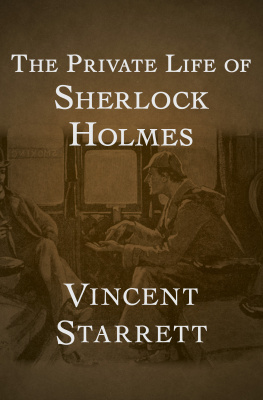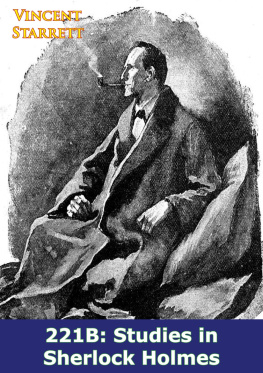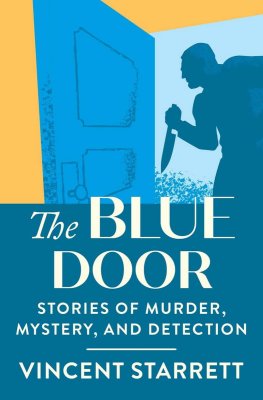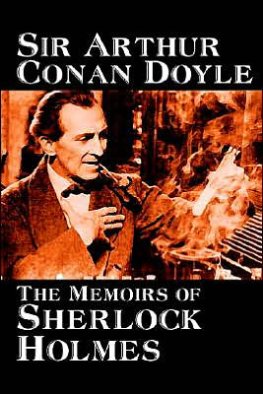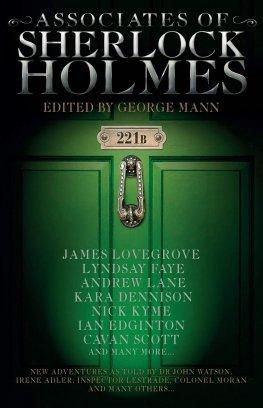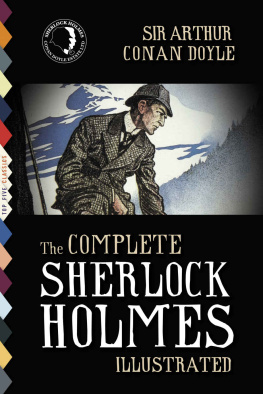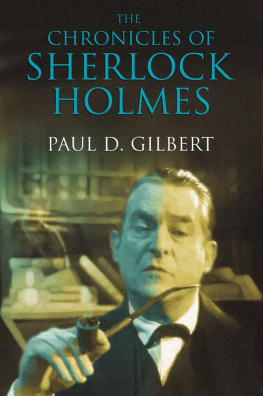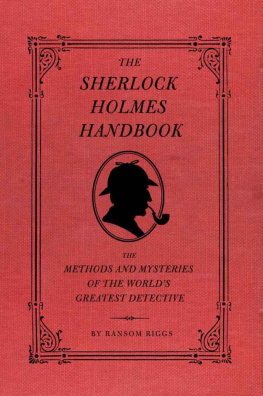Vincent Starrett - The Private Life of Sherlock Holmes
Here you can read online Vincent Starrett - The Private Life of Sherlock Holmes full text of the book (entire story) in english for free. Download pdf and epub, get meaning, cover and reviews about this ebook. publisher: MysteriousPress.com/Open Road, genre: Detective and thriller. Description of the work, (preface) as well as reviews are available. Best literature library LitArk.com created for fans of good reading and offers a wide selection of genres:
Romance novel
Science fiction
Adventure
Detective
Science
History
Home and family
Prose
Art
Politics
Computer
Non-fiction
Religion
Business
Children
Humor
Choose a favorite category and find really read worthwhile books. Enjoy immersion in the world of imagination, feel the emotions of the characters or learn something new for yourself, make an fascinating discovery.
- Book:The Private Life of Sherlock Holmes
- Author:
- Publisher:MysteriousPress.com/Open Road
- Genre:
- Rating:4 / 5
- Favourites:Add to favourites
- Your mark:
- 80
- 1
- 2
- 3
- 4
- 5
The Private Life of Sherlock Holmes: summary, description and annotation
We offer to read an annotation, description, summary or preface (depends on what the author of the book "The Private Life of Sherlock Holmes" wrote himself). If you haven't found the necessary information about the book — write in the comments, we will try to find it.
The Private Life of Sherlock Holmes — read online for free the complete book (whole text) full work
Below is the text of the book, divided by pages. System saving the place of the last page read, allows you to conveniently read the book "The Private Life of Sherlock Holmes" online for free, without having to search again every time where you left off. Put a bookmark, and you can go to the page where you finished reading at any time.
Font size:
Interval:
Bookmark:

The Private Life of Sherlock Holmes
Vincent Starrett

MYSTERIOUSPRESS.COM

TO
W ILLIAM G ILLETTE
F REDERIC D ORR S TEELE
AND
G RAY C HANDLER B RIGGS IN
G RATITUDE
ENTER MR. SHERLOCK HOLMES
T HE LONDON SEASON OF THE YEAR 1886, UPON ITS surface, was much as other and similar seasons had been before it. No blare of sudden trumpets marked its advent. Victoria was still placidly upon her throne; Lord Salisburyfor the second timehad ousted Gladstone from the premiers chair; Ireland was seething with outrage and sedition; and Beechams Pills were universally admitted to be a marvellous antidote for nervous disorders. In literature the gods, perhaps, were Stevenson and Henry James and Henty, depending upon ones age; but an Irishman named Wilde was making himself a figure of fantastic moment by his championship of aestheticism. At the Gaiety, Mr. Celliers Dorothy had begun its celebrated run of 968 performances, and The Harbor Lights were gleaming brightly at the Adelphi. In Piccadilly the race of hansom cabs was swift and dangerous. No wars immediately threatened; the wide world was at peace. A smug and happy time, a time of prosperity and great contentment. And no celestial phenomena existed to indicate that, once more in the history of the world, a blue moon was marking an epochal event. Certainly no planets fell to tell an impoverished provincial doctor, resident at Southsea, Portsmouth, that he had brought forth a new immortal in the world of letters.
Sherlock Holmes, however, was already in the world. With a Dr. Watson, late of the 5th Northumberland Fusiliers, he had engaged a suite of rooms at No. 221-B Baker Street, London, and entered upon his astonishing career as a consulting detective. As far as the world is concerned, he is there yet.
Times had not been of the best for Dr. A. Conan Doyle of Bush Villa, Southsea. The young man had recently married, and was eking out the slender returns of early medical practice by writing stories for the magazines. It had occurred to him that he might go on writing short stories forever and make no headway. What was necessary, he was certain, if one intended to be an author, was to get ones name upon the cover of a book. A first novelThe Firm of Girdlestonehad been an impressive failure, and was still in manuscript about the house. But he had, for some time, been turning in his mind the possibility of something new and fresh in the literature of detection. Gabouriau had pleased him by the precision of his plots, and a boyhood hero had been the Chevalier C. Auguste Dupin, Poes masterful amateur detective. What was there, he asked himself, that heDoylecould bring to this field, which would be indubitably his own?
Outside, over his door, at night, burned the red lamp that was the sign of his profession. In the daylight, his brass nameplatepolished every morningshone brightly in the Portsmouth sun. But the patients that either of them should have attracted were few and far between. In his patients sitting roomthree chairs, a table, and a patch of carpetas he smoked and thought, there rose before him the remembered image of his former teacher at the universityone Joseph Bell, thin, wiry, dark, with a high-nosed, acute face, penetrating grey eyes, angular shoulders, and a peculiar walk. Joseph Bell, M.D., F.R.C.S., Edinburgh; consulting surgeon to the Royal Infirmary and Royal Hospital for Sick Children, whose voice was high and discordant, whose skill as a surgeon was profound, and whose uncanny trick of diagnosis was a legend of the institution. It occurred to the young physician, waiting for his patients who did not come, that if Joseph Bell had determined to be a detective, he would have reduced this fascinating but unorganized business to something nearer an exact science.
Bell, for reasons which Doyle the student had never quite understood, had singled him out from among the droves of others who frequented the wards, and made him his out-patient clerk. It was not an onerous position. The student herded the waiting patients into line, made simple notes of their cases, and ushered them into the big room in which Bell sat in state. But it had been quickly evident to young Arthur Conan Doyle that Joseph Bell learned more about the patients at a glance than he, the questioner, had learned with all his questions.
He would sit in his receiving room, wrote Doyle the novelist, later in life, with a face like a red Indian, and diagnose the people as they came in, before they even opened their mouths. He would tell them their symptoms, and even give them details of their past life; and hardly ever would he make a mistake.
The results were often highly dramatic. To a civilian patient, on one occasion, he observed: Well, my man, youve served in the army.
Aye, sir.
Not long discharged?
No, sir.
A Highland regiment?
Aye, sir.
A non-com. officer?
Aye, sir.
Stationed at Barbados?
Aye, sir.
You see, gentlemen, explained the physician to his surrounding students and dressers, the man was a respectful man but did not remove his hat. They do not in the army; but he would have learned civilian ways if he had been long discharged. He has an air of authority, and he is obviously Scottish. As to Barbados, his complaint is elephantiasis, which is West Indian and not British.
And no little of the dry humor of Joseph Bells deductions is visible in another case that is of record.
What is the matter with this man, sir? he suddenly inquired of a trembling student, standing by. Come down, sir, and look at him. No, you mustnt touch him. Use your eyes, sir! Use your ears, use your brain, use your bump of perception, use your powers of deduction!
The stammering student did his best: Hip-joint disease, sir?
Hip-nothing! retorted Bell disgustedly. The mans limp is not from his hip but from his foot, or rather from his feet. Were you to observe closely you would note that there are slitscut by a knifein those parts of the shoes on which the pressure of the shoe is greatest against the foot. The man is suffering from corns, gentlemen, and has no hip trouble at all. But he has not come to us to be treated for corns, gentlemen; we are not chiropodists. His trouble is of a more serious nature. This is a case of chronic alcoholism, gentlemen. The rubicund nose, the puffed and bloated face, the bloodshot eyes, the tremulous hands and twitching face muscles, with the quick, pulsating temporal arteries, all combine to show us this. But these deductions, gentlemen, must be confirmed by absolute and concrete evidence. In this instance, my diagnosis is confirmed by the neck of a whisky bottle protruding from the patients right-hand pocket.
Of another patient, he once said: Gentlemen, we have here a man who is either a cork-cutter or a slater. If you will use your eyes a moment, you will be able to define a slight hardeninga regular callus, gentlemenon one side of the thumb; a sure sign that he follows the one occupation or the other.
And of still another, he observed: Gentlemen, a fisherman! You will note that, although it is a summers day, and very hot, the patient is wearing top boots. When he sat upon the chair they were plainly visible. No one but a sailor would wear top boots at this season of the year. The shade of tan upon his face shows him to be a coastwise, not a deep-sea sailor who makes foreign lands. His tan is that produced by one climate onlyit is a local tan. A knife scabbard shows beneath his coat, the kind used by fishermen in this part of the world. He is concealing a quid of tobacco in the farthest corner of his mouth, and he manages it very adroitly indeed, gentlemen. The sum of these deductions is that he is a fisherman. Further to prove the correctness of my diagnosis, I notice a number of fish-scales adhering to his clothes and hands, while the odor of fish announced his arrival in a most marked and striking manner.
Font size:
Interval:
Bookmark:
Similar books «The Private Life of Sherlock Holmes»
Look at similar books to The Private Life of Sherlock Holmes. We have selected literature similar in name and meaning in the hope of providing readers with more options to find new, interesting, not yet read works.
Discussion, reviews of the book The Private Life of Sherlock Holmes and just readers' own opinions. Leave your comments, write what you think about the work, its meaning or the main characters. Specify what exactly you liked and what you didn't like, and why you think so.

